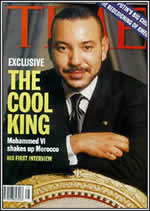 A February 20 protest has been planned to restore "the dignity of the Moroccan people and for democratic and constitutional reform and the dissolution of parliament." One of Morocco’s leading Islamist movements, Justice and Charity, which has an estimated 200,000 members and is banned from politics but tolerated, has called for “urgent democratic change.” It’s website states “It is unjust that the country’s riches should be monopolised by a minority.”
A February 20 protest has been planned to restore "the dignity of the Moroccan people and for democratic and constitutional reform and the dissolution of parliament." One of Morocco’s leading Islamist movements, Justice and Charity, which has an estimated 200,000 members and is banned from politics but tolerated, has called for “urgent democratic change.” It’s website states “It is unjust that the country’s riches should be monopolised by a minority.”
Abdesslam Yassine, leader of Justice and Charity does not challenge the monarchy itself, but refuses to recognise Mohammed’s religious title of Commander of the Faithful. He was put under house arrest for several years under King Hassan, but King Mohammed VI lifted the restriction shortly after coming to power in 1999. Morocco is a constitutional monarchy with an elected parliament, but the constitution allows the king to dissolve the legislature, impose a state of emergency and have a key say on the appointment of sensitive government portfolios, including the prime minister. Justice and Charity would like to replace the constitution with "a democratic one to mark a break with all aspects of autocracy ... and monopolisation of authority and national wealth and preserves the human dignity of the Moroccan citizen". “It’s an Islamism that is anti-establishment that is pushing for peaceful change,” said Islam expert Mohamed Darif of Justice and Charity. “It doesn’t talk about abolishing the monarchy.”
Economist Najib Akesbi calls Morocco “A young, largely idle population facing problems of lack of training, employment and prospects and a fairly closed political horizon,” and further says the country is plagued by corruption and nepotism. According to Human rights Watch in 2009, “Human rights conditions deteriorated overall in 2009 in Morocco, although the country continued to have a lively civil society and independent press. The government, aided by complaisant courts, used repressive legislation to punish and imprison peaceful opponents, especially those who violate taboos against criticizing the king or the monarchy, questioning the "Moroccanness" of Western Sahara, or "denigrating" Islam. ... Police are rarely held accountable for violating human rights. In cases with political overtones, courts seldom provide fair trials; judges routinely ignore requests for medical examinations lodged by defendants who claim to have been tortured, refuse to summon exculpatory witnesses, and convict defendants on the basis of apparently coerced confessions.” The Committee to Protect Journalists expressed concern in a November 9, 2010 report over an “increasing climate of hostility for Spanish journalists in Morocco, highlighted by official measures to prevent Spanish journalists from covering clashes in the Western Sahara.”
The Moroccan Minister of Communication, Khalid Naciri, said on February 3 that the government felt "serene" about the calls for protests. "Morocco ... has embarked a long time ago on an irreversible process of democracy and widening of public freedoms. That citizens are able to express themselves freely does not disturb us in any way." He warned, however, that such protests must not harm national interests and constitutional values, but "Nothing suggests to us that it will be otherwise."
"We intend to reassure those who are organizing protests on the internet that this is an entirely normal thing and is part of the democratic life of Morocco," Telecommunications Minister Khaled al-Nasiri told newspaper Hespress. "We are used to such initiatives growing up and have for years been open to freedom of opinion and expression.”
Menouar Alem, ambassador of the Kingdom of Morocco to the EU, said his country was stable because they had put in place a multi-party system, given workers freedom to unionise and enshrined people's right to protest. Moreover, he said that the country had a consistent policy of promoting women's rights, family planning and investing in human resources. King Mohammed VI has tried to reduce poverty and cut what was one of the highest illiteracy rates in the Arab world while developing infrastructure to attract foreign investment and create jobs. Rating agencies Standard & Poor's and Fitch have said the North African country of 32 million people is the least likely in the region to be affected by the wave of popular unrest.
Theme by Danetsoft and Danang Probo Sayekti inspired by Maksimer